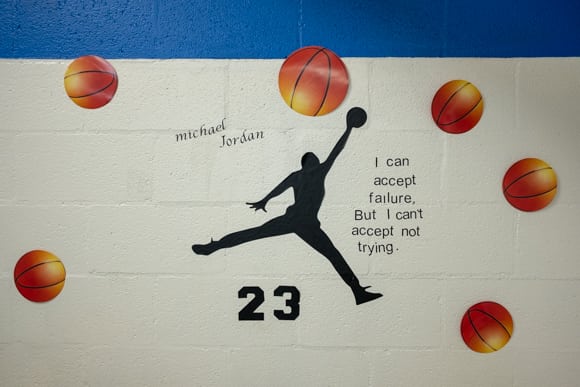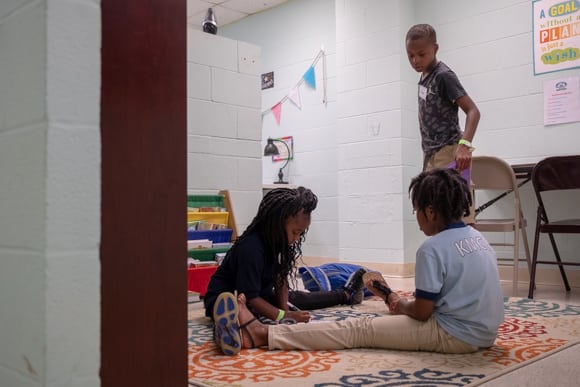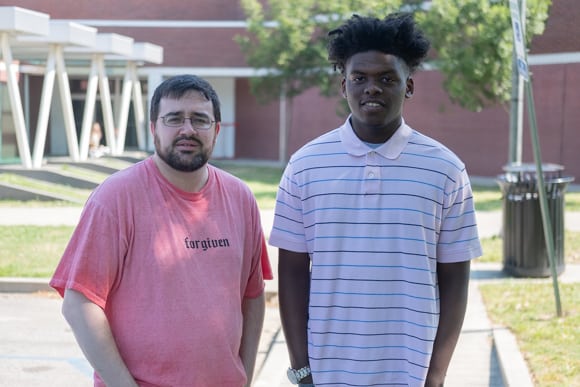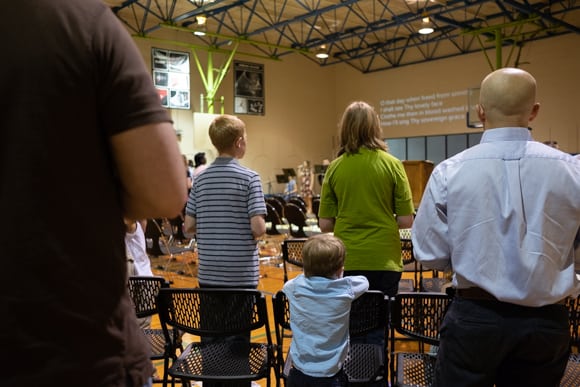Facing serious concerns like drugs, gangs, and crime, communities often call for more youth programming to keep kids safe and productive. In Uptown, a handful of organizations are already working to build thriving kids and a thriving community, but they can’t do it alone.
There’s a concern in Uptown. It’s a concern familiar to many neighborhoods with a history of disinvestment. It was voiced in the Community Redevelopment Agency’s recent Uptown community listening sessions. Neighbors also echoed the sentiment to the High Ground News team in an April editorial advisory.
Uptown’s youth need healthy alternatives to unsavory street activities.
“This is important because we’ve got so many gangs and things kids can get into these days. They need things like this to keep them away from that. If they didn’t have places like MAM [Memphis Athletic Ministries] to come in, they’d be out in the streets,” said Ernie Prude, area director for Memphis Athletic Ministries.
While there is always a need for more constructive activities for youth, Uptown already has a host of organizations and individuals wrapping around its kids to see them successfully to adulthood. They’re doing it not just with strong programming but deep, interpersonal relationships that turn neighbors into family. And the real opportunity, they say, is raising awareness and community support for the efforts already underway.
Strong Programs for Powerful Support
Girls Inc. is the oldest youth organization in the area, dating back to 1946. Its Lucille Devore Tucker Center is located at 686 North Seventh Street and is described by president and CEO Lisa Moore as its “number one anchor.”
 A group of MAM students plays half court basketball inside the gymnasium of the Greenlaw Community Center. (Brandon Dahlberg)
A group of MAM students plays half court basketball inside the gymnasium of the Greenlaw Community Center. (Brandon Dahlberg)
The center serves girls six to eighteen-years-old with after-school and weekend programs and camps during school breaks. It is open to all girls across the region, but Uptown’s 38107 ZIP code is one of its primary service areas and Moore agrees that programs are especially important in the Uptown community.
“When you look at the reality of our neighborhoods, where you have over 50 percent of the households headed by single women and another forty by married couples, that’s over ninety percent of the neighborhood informed directly by a woman’s earning power,” said Moore.
“So it is essential that we equip our girls to have post-secondary plans for their education and career attainment, for them to be prepared for well-paying jobs after school. That we equip them to see what’s possible and help ignite what’s inherently in them.”
BRIDGES is another organization located in Uptown that serves youth from across the region. Their Jim Boyd BRIDGES Center opened at 477 North Fifth Street in 2004 and offers workshops, camps, a yearly end-of-summer festival, and an indoor climbing wall open to the public two to three nights a week. Teens participate in a team building exercise during a BRIDGES youth training event. Director Mario Hendrix said BRIDGES’ 60-zip code services area provides a unique advantage for Uptown’s youth.
Teens participate in a team building exercise during a BRIDGES youth training event. Director Mario Hendrix said BRIDGES’ 60-zip code services area provides a unique advantage for Uptown’s youth.
”BRIDGES is all about giving youth opportunities to meet and interact with other students who are different from them and different from peers they’d meet in their own neighborhoods,” he said. “Through these conversations, they can explore areas outside their community and also showcase their own.”
Memphis Athletic Ministries is comparatively new but is having a major impact. Since 2010, their Greenlaw center at 190 Mills Avenue has served up to 120 kids a day. From 2:30 p.m. until 7 p.m., students participate in sports, literacy programs, life skills classes, field trips, and bible study.
Oasis of Hope formed out of Cordova’s Hope Presbyterian Church in 2001. They began by volunteering with other organizations then purchased a few small buildings for office and community space. They eventually started their own after school and literacy programs, a girl’s choir, and sports and bike repair programs.
“Year after year there’s something new that, from our faith-based perspective, God provides the opportunity and resources to make happen,” said executive director Terry Hoff.
Today, Oasis serves around 90 kids daily at their youth center located in the back of the Bickford Community Center at 233 Henry Avenue.
Deep Relationships for Deep Change
While organizations and their programs are critically important, their staffs say it’s the efforts they make towards individual relationships that have the biggest impacts.
For example, each MAM staffer has a group of kids they directly mentor.
 Decorations inside the Greenlaw Community Center provide encouraging messages for MAM students. (Brandon Dahlberg)
Decorations inside the Greenlaw Community Center provide encouraging messages for MAM students. (Brandon Dahlberg)
April Golden’s current group of girls are planning a mani-pedi night at her house, complete with takeout and movies. And after eight years, she now has kids home from college for the summer who will visit for all the typical things — food, love, laundry.
“I’ve developed some really deep relationship with a lot of kids over the years. So much so that I’m like a momma to a lot of them,” said Golden, assistant neighborhood director and a founder of the Greenlaw center.
Prude echoed her sentiment.
“It’s like another part of your family. It’s more stressful because it’s more kids outside of the other kids you already have in your house,” he said.
“You have to go to school stuff, when something goes wrong at home, they call you. Every day, every hour of the day. But it’s good that they trust you that much, they know that you’re going to come alongside them whatever it is.”
Oasis has similar relationships with many of its youth that now span generations. There’s more than one example of someone growing up in Oasis programs and their children now attending similar programs.
The nonprofit also has employees who have been with Oasis since childhood.
 Several elementray school students work on homework after school at Oasis of Hope. (Brandon Dahlberg)
Several elementray school students work on homework after school at Oasis of Hope. (Brandon Dahlberg)
Jasmine Martin is Oasis’ middle and high school girls developer. She first connected with Oasis in 7th grade. She hung out with her friends and helped found a girl’s bible study. In high school, she helped launch the Angel Street Choir. Throughout college she volunteered for the middle and high school programs. After graduating with a degree in supply chain management, she returned to work for Oasis in November of 2014.
Related: “Choir provides musical oasis for girls in North Memphis”
“Over the years, we’ve been really intentional about relationship building and transforming lives through our networks. Providing this community with a network of support to get from one place in life to another place, to be better for the entire family,” she said of Oasis and her experience.
Kevin Miller is the newest member of the Oasis team and a former Oasis youth.
“I started in elementary school with the Read to Succeed program. I started learning how to read, I met a lot of people, I met Terry [Hoff],” he said. “It’s like family. I’ve been around them going on 12 years now.”
While MAM and Oasis work through a blend of formal programming and informal relationships, Grace Church is almost entirely relationship-based.
“The most encouraging work going on is not a program,” said Nathan Sawyer, one of a council of pastors and elders who govern Grace.
Grace began 11 years ago with a few families feeling called to move to the neighborhood and begin a service-based ministry. Today they have around 100 congregants and hold services in MAM’s Greenlaw center gym. While they do now have some formal youth programs, it’s not their focus.
Church member Dan Reisman is an example of their core mission of deep, one-on-one relationships and support. Reisman is originally from New York and moved to the neighborhood in 2008.
He began volunteering at MAM, joined Grace Church, and soon opened his home to neighborhood youth. On any given night you’ll find at least half a dozen teenagers playing video games, discussing life and faith, or doing what teens do best — eating. His home features an extra deep freeze and pantry just for the kids’ snacks.
 Dan Reisman and DeVonte Barnes outside of the Greenlaw Community Center, where Grace Church Memphis meets every Sunday. (Brandon Dahlberg)
Dan Reisman and DeVonte Barnes outside of the Greenlaw Community Center, where Grace Church Memphis meets every Sunday. (Brandon Dahlberg)
For Reisman, it’s about showing them the possibilities within themselves and their neighborhood.
“When I ride these guys around the neighborhood, there’ll be a piece of land, and I’ll be like, “There’s your business. It’s waiting on you,” he said. “I don’t want to be the face of the neighborhood, I want them to be that face. I want to be the person who created the leader for the neighborhood, not the leader.”
Reisman has a special relationship with one boy in particular. Reisman met DeVonte Barner in 2014 and they formed a fast friendship. In 2016 Barner was in danger of entering the foster care system and being displaced from the neighborhood. He asked Reisman if he would petition for legal guardianship.
Reisman describes Barner as quiet and introverted. He plays basketball, is musically gifted, and a good student. Barner is now a graduating senior at Kipp Memphis Collegiate High School with plans to attend Webster University in St. Louis this fall. For his part, Barner says moving in with Reisman was a chance to deepen their relationship and his relationship to Grace Church.
“When I first started going [to Grace], it was awkward. I was young. It was a lot of white people. But they really showed up. At first I didn’t know how to take it, but now I just embrace it. I know them, it’s like family. They’re very loving. I think they practice what they preach. They’re true Christians,” said Barner.
The Biggest Need for a Bigger Impact
These organizations and others like them have definitely seen positive change in the neighborhood.
“I’ve seen a huge change in the kids and in the community. It used to be really heavily infested with gangs,” said Golden.
“There were a lot of fights and shootings. But over the last three years especially, I’ve seen a drastic turnaround. I think it’s just because of the culture we’ve developed here … They know what we’re about. When [gang members] do come, they come and fall in just like all the rest of the kids. They play ball and hang out.”
 Members of the church sing worship songs to begin their morning service at Grace Church Memphis. (Brandon Dahlberg)
Members of the church sing worship songs to begin their morning service at Grace Church Memphis. (Brandon Dahlberg)
That said, there is a major barrier to expanding their efforts and impact. Despite years in the neighborhood, there are still youth who are unaware of these organizations and their offerings, and there are still community members who don’t know the need for volunteers or how to get involved.
It’s simple investments — teaching a job skills class, helping with administrative work, reading with students, shooting a game of hoops, or simply being a listening ear — that add up to big change.
“We need more people in the community to understand that we can’t do this alone,” said Golden. “A lot of these kids just want that attention and love, but we can’t be that for everyone.”
Similarly, Oasis uses volunteers to supplement its staff and needs community members to help spread the word. Nathan Sawyer with Grace Church said they’d like to see a nonprofit pharmacy, pre-natal clinic, and counseling center, but those too need volunteers to be successful.
For Girls Inc. and BRIDGES, the need is more for awareness among youth. While a regional service area means exposure to new people and ideas for Uptown’s youth, it also means less ability to target recruitment to the neighborhood.
“We do have a few local students who participate, but I would say involvement isn’t particularly strong. We definitely want Uptown youth to know about all the opportunities going on at BRIDGES on a weekly basis,” said Kat Netzler, director of communications at BRIDGES.
In all cases, it will take a group effort of community members and organizations to ensure that every child has the opportunity to learn and play in a safe and nurturing space, surrounded by people who are fiercely committed to their success.
As Prude said and others echoed, “We have them for a few hours of the day. They have to go back out to the community. So if we can get the community on our side, to do the same things we’re doing inside out there … it takes a village. That’s real.”



